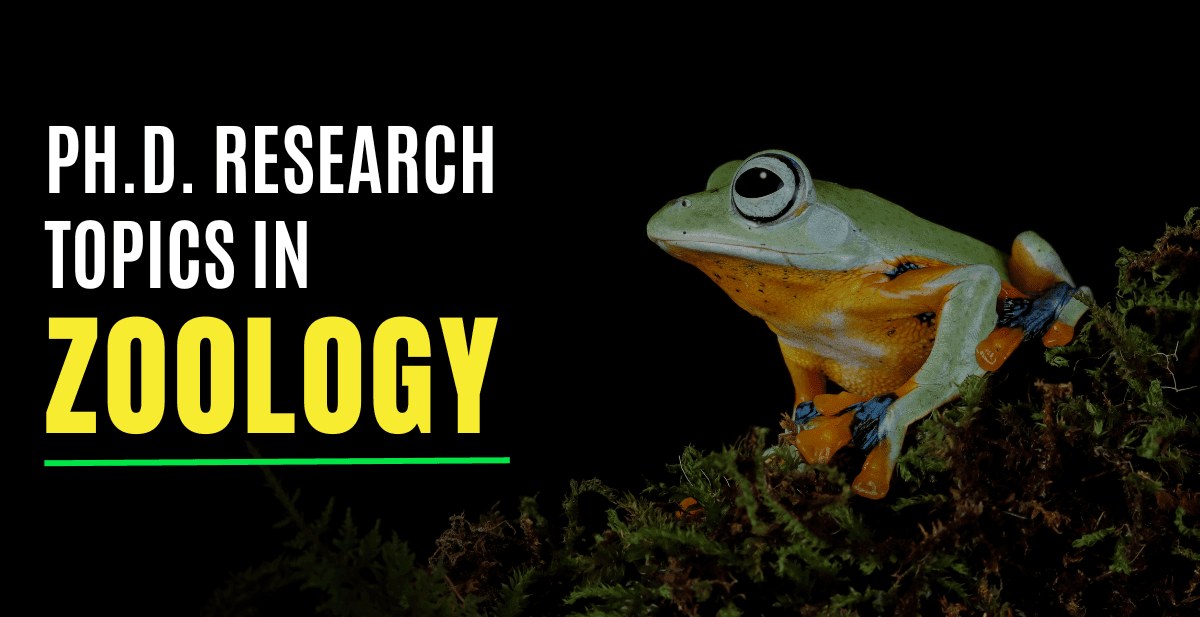- June 19, 2023
- by IdeaLaunch
- Ph.D. Guidance, Ph.D. Research Proposal Topic, Research Projects
Ph.D. Thesis Research Topics in the Field of Zoology
Introduction:
Ph.D. Zoology is a three year doctorate program in Zoology Domain, It is the study of animals and their structural groups and the presence of science in the environment. There are various branches available in zoology such as Mammalogy, Primatology, Herpetology, Paleontology, and Ornithology.
Let’s see the meaning of each branch briefly:
- Mammalogy: It is a study about mammals.
- Primatology: It is a study about the apes apart from humans.
- Herpetology: It is a study about reptiles or amphibians like snakes, frogs, crocodiles etc.
- Paleontology: It is the study of dead animals.
- Ornithology: It is a study of birds.
List of Research topics that comes under the Zoology syllabus:
- Endocrinology
- Entomology
- Immunology
- Wildlife biology
- Toxicology
- Genetics
- Molecular biology
Is there any scope to do a Ph.D. in Zoology?
Yes, you can work in many universities, government schools as a researcher and as a teacher. You can also work as a wildlife educator or animal forensic expert. There is a demand for this zoology graduation in both international and domestic markets, through internship, training, projects etc.
Why choose Zoology as a major Ph.D research topic?
A Zoology graduate could work as a researcher, professor, animal caretaker, wildlife professions, etc. The jobs are available in both public and private sectors.
Understandable people can study biology, anatomy, physiology of many animals and how they interact with their environment. At the end of the results, we will be able to make good decisions and make solutions for current and future earth.
The outlook of this job and their occupations is improving. It’s important than to look after the animals and figure out how to best safeguard their habitats as the environment changes.
What does a zoologist exactly do?
A zoologist studies their physical characteristics, diets and the behaviour of the animals in this environment. They may specialize in studying a particular animal or animal group. Work of the zoologist is also crucial in protecting endangered species and other wildlife animals from habitat loss, diseases, exotic species and climate change.
Top areas of recruitment:
Wildlife sanctuaries, National park, Zoos, Botanical gardens, veterinary hospitals, pharmaceutical companies, museums, fisheries and aquaculture, research laboratories and animal clinics.
Ornithology:
The research topic of ornithology is a branch of zoology that studies the methodology and knowledge of birds and related to them.
Endocrinology:
The research topic of endocrinology is a field in biology, which studies the endocrine system. The organs that present in this system are Pituitary, thyroid, adrenal, ovaries, testes and pancreas.
Entomology:
The Research topic of entomology is to study about the insects and their bonding between humans and other organisms.
Immunology:
The Research topic of immunology is the study of the immune systems in the human body and it is the most significant topic in the branch of medical and biological science. This system is protected from infections through various aspects.
Fisheries and aquaculture:
This topic is to research about how to increase their harvesting of fish and other aquatic life. Aquaculture that involves brackish water, cultivating freshwater and saltwater populations.
Wildlife biology:
This research topic about wildlife biology is to study the roles of each animal and its habitat. The main role of a wildlife biologist is to make experiments or studies about the animals and their habitat.
If you are still not sure about how to start your research topic, then Idealaunch is the perfect place to get complete guidance for your research projects. Get a consultation from our experts. Call us at +91- 7904479887 / +91-7548889787 or Mail us at info@idealaunch.in




84 Comments